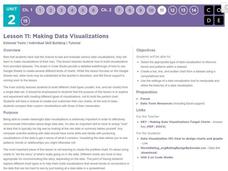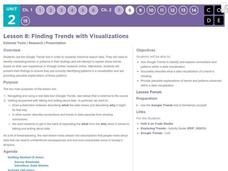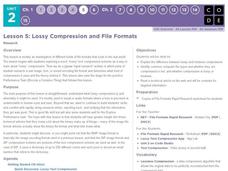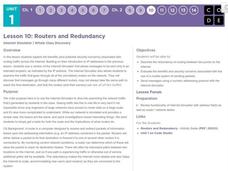Code.org
Making Data Visualizations
Relax ... now visualize the data. Introduce pupils to creating charts from a single data set. Using chart tools included in spreadsheet programs class members create data visualizations that display data. The activity encourages...
Code.org
Good and Bad Data Visualizations
Good versus bad data. Pairs rate online collections of data representations from good to bad and then suggest ways to improve the visualizations. The class then creates a list of best practices and common errors in data representations...
Code.org
Practice PT - Encode an Experience
Encoding What I did Last Summer. Class members develop a way to encode a personal experience using a top-down approach to determine components and sub-components of their experience They then pick one portion of the experience and go...
Code.org
APIs and Using Functions with Parameters
Introduce your class to the API, a reference guide that lists and explains the functionality of programming language. Using JavaScript, individuals draw complex designs that require additional commands and parameters defined in the API...
Code.org
Using Simple Commands
Turtles might be slow, but class will zoom by when your pupils build a program in which reptiles draw a grid. Using App Lab and JavaScript, class members build a program to find the most efficient way to draw an image of a three-by-three...
Code.org
Practice PT - Tell a Data Story
Show your class how it all comes together. The last lesson in a unit of 15 has individuals take everything they learned in the data section to analyze the class-generated data. The pupils find a story they want to tell that appeals to...
Code.org
Finding Trends with Visualizations
Pupils often hear about trends, but they don't always see them. The eighth lesson plan in a unit of 15 requires individuals to use the Google Trends tool. Class members identify patterns in the visualization before presenting the...
Code.org
Lossy Compression and File Formats
I'm compressed. Groups do a rapid research of different file types to determine what kind of compression the formats use and how it works. They share their information with the rest of the class until everyone has all the information for...
Code.org
Text Compression
The second instructional activity in a unit of 15 introduces pupils to text compression. The class begins with discussing how they already use text compression when sending text messages. Pairs learn more about the subject as they work...
Code.org
Bytes and File Sizes
A bite of bits. The first lesson in a unit of 15 introduces the class to the byte. Pupils learn about other standard units for measuring file sizes, develop an understanding of relative sizes and the kind of units used to measure...
Code.org
Algorithms Detour - Shortest Path
Young programmers investigate the Single Source Shortest Path problem by working in paris to devise their own algorithm. They then progress to using Dijkstra's Algorithm to solve the problem.
Code.org
Routers and Redundancy
How are messages to the right recipient? Introduce the concept of routing Internet traffic by drawing a comparison to sending a letter. Groups use the Internet Simulator program to send messages to others using the same router and...
Code.org
Encoding Numbers in the Real World
Ah, the numerous number of numbers. Individuals research different ways of encoding numbers. After conducting their initial research, they find classmates who have researched a different article and the pair share information. The lesson...
Code.org
Sending Numbers
Binary graphing ... bit by bit. Pairs work together to develop a protocol in order to send the points of a graph. One partner sends the points and the other receives them and tries to recreate the graph. The pupils use the rubric to...
Code.org
Sending Binary Messages with the Internet Simulator
Show your class how to develop a protocol to solve a problem. Pupils then continue with working with binary messages but refine a protocol to assist with the distinction of individual bits by including a bit rate. Finally, the pairs use...
Code.org
Personal Innovations
Here's a resource designed to serve as an introduction to a computer science course. Groups brainstorm an innovation that may improve technology or use technology to solve a problem. The plan guides the teacher through the introduction...
Computer Science Field Guide
Computer Science Field Guide
Imagine computer science all summed up in one book. This resource provides 16 chapters that cover many aspects of computer science, ranging from algorithms to software engineering. The e-book contains links to applets to help explain...
Teach Engineering
Earthquakes Living Lab: Geology and Earthquakes in Japan
Sometimes it seems as if earthquakes hit the same places over and over again. Class members study Japan in order to determine why earthquakes keep happening there. Pairs work together to research and try to determine whether there are...
Teach Engineering
Earthquakes Living Lab: FAQs about P Waves, S Waves and More
Let's talk about earthquakes .... Using the Internet, pupils research what causes earthquakes, how scientists measure them, their locations, and their effects. The resource is not only informative, but it also builds crucial research...
Code.org
Packets and Making a Reliable Internet
That's not what I said! My message did not arrive in the correct order! Introduce the concept of packets and the transmission control protocol used to send and receive information over the Internet. The class participates in an unplugged...
Code.org
How Routers Learn
Your routers don't seem to be routing correctly. To figure out why, pupils act like routers, talk to their direct connects in order to determine as much information about the simulated network as possible. As they learn more about paths,...
Code.org
Encoding and Sending Formatted Text
Introduce your class to encoding text. Pairs work together to create a protocol to send text prior to learning ASCII encoding. Groups then collaborate to send and translate ASCII codes creating a formatted text message.
Code.org
Number Systems
Generating a system of shapes. Groups work together to create a number system using three different shapes as symbols. The groups should come up with the rules that generate all the possible permutations of the three shapes.
Teach Engineering
Earthquakes Living Lab: Finding Epicenters and Measuring Magnitudes
Pairs use an online simulation to determine the epicenter and magnitude of an earthquake. Using real data about the earthquake's maximum S wave amplitudes, they then determine the magnitude. The resource provides a great career...

























